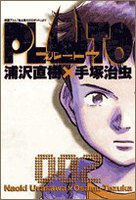

Story & Art: Naoki Urasawa
Original creator: Osamu Tezuka (Tetsuwan Atom)
Summary:
QUOTE
In the years since humans and robots first started living together, there has only been one murder of a human by a robot. Eight years after that incident, investigators are called to a crime scene to investigate the death of a prominent robot rights supporter. The state of the victim, having been murdered in a brutal fashion and left with decorative horns on his head, draws a chilling parallel to the death of the robot hero Montblanc. When accidental footage of the scene reveals that the killer was a robot so advanced that it could pass for a human, the robot investigator Gesicht begins his search for not only the killer, but the truth to his own past and the events of the 39th Central Asian Conflict. - summary by Zushio.
Background:
QUOTE
In Naoki Urasawa's Pluto we have a story arc from the classic Astro Boy (or Tetsuwan Atom) series that is taken, refined, and retold. Gone is the cutesy art that typified Osamu Tezuka manga, replaced by updated and realistic versions of classic robots. Also gone are the child friendly messages and dialog, and in their places is something incredible.
The removal of the typical Tezuka elements from the story do not weaken it, and in fact allow Urasawa to show a far deeper and meaningful story than the original. Focusing on Gesicht, a minor character from the original story, rather than Atom, the focus moves from action to plot. The manga deals intensely with the issues of robot rights, human rights, and the ramifications of two divergent forms of life. Questions are raised regarding the place of robots in society, what separates a human from a robot, and most importantly, how close to human a robot can become. The story telling is excellent, and few manga in the genre are as emotionally intensive, the short Norse #2 arc being particularly powerful.
The only fault that I can find with Pluto is that the character design is a little too similar to Naoki's other works, Monster and 20th Century Boys and while this isn't necessarily a bad thing, some people may have an issue with his realistic art style. Halfway through the story, the pacing indicates that it should wrap up quite nicely in another volume or two. I'd personally recommend this manga to fans of both Naoki Urasawa and Osamu Tezuka, along with sci-fi and mystery fans.
The removal of the typical Tezuka elements from the story do not weaken it, and in fact allow Urasawa to show a far deeper and meaningful story than the original. Focusing on Gesicht, a minor character from the original story, rather than Atom, the focus moves from action to plot. The manga deals intensely with the issues of robot rights, human rights, and the ramifications of two divergent forms of life. Questions are raised regarding the place of robots in society, what separates a human from a robot, and most importantly, how close to human a robot can become. The story telling is excellent, and few manga in the genre are as emotionally intensive, the short Norse #2 arc being particularly powerful.
The only fault that I can find with Pluto is that the character design is a little too similar to Naoki's other works, Monster and 20th Century Boys and while this isn't necessarily a bad thing, some people may have an issue with his realistic art style. Halfway through the story, the pacing indicates that it should wrap up quite nicely in another volume or two. I'd personally recommend this manga to fans of both Naoki Urasawa and Osamu Tezuka, along with sci-fi and mystery fans.


 Jun 12 2006, 09:26 AM, updated 20y ago
Jun 12 2006, 09:26 AM, updated 20y ago
 Quote
Quote 0.0125sec
0.0125sec
 0.39
0.39
 5 queries
5 queries
 GZIP Disabled
GZIP Disabled